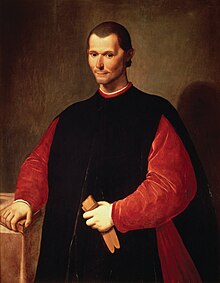 Eli, of course, slums. Among other places he likes to discover the Curry worst, but occasionally gold appears amidst the dross which needs to be washed in the cool waters of Rabett Run (simile abuse for fun and little prophet). A defining characteristic of the Pielkesphere (TM ER) is a complete lack of self awareness or awareness of anything beyond the third grade level, which lead Judy to ask "So, how do you think Machiavelli would advise the Prince on dealing with climate change?"
Eli, of course, slums. Among other places he likes to discover the Curry worst, but occasionally gold appears amidst the dross which needs to be washed in the cool waters of Rabett Run (simile abuse for fun and little prophet). A defining characteristic of the Pielkesphere (TM ER) is a complete lack of self awareness or awareness of anything beyond the third grade level, which lead Judy to ask "So, how do you think Machiavelli would advise the Prince on dealing with climate change?"
Robert, teaches
It is a sad reality that those that
devote a considerable part of their lives to textual analysis are
sometimes not very good at it, and that seems to be the case here.
Machiavelli did not recommend submission to the whims of Fortune. Quite
the opposite. Machiavelli wrote at a time when submission to fate or
providence was considered a religious value and a sign of good
character; he rejected that, and urged that a leader strive to control
his destiny as far as was practical.
If you were to lay a problem like climate change before Machiavelli,
you would find he would confront the problem ruthlessly and
pragmatically, wasting no time on science denial or other forms of
wishful thinking. He would isolate and undermine opponents of such a
policy, highlighting their factual mistakes, scientific ignorance, and
predilection for hateful, spiteful, and physically threatening abuse (1,
2, 3).
Finally, Machiavelli would use the issue of global warming to advance
the position of the government relative to the opposition, and of the
state relative to its external rivals. He might counsel establishing a
commanding lead in the relevant technologies, using trade penalties or
trade agreements to secure commitments to cut emissions, or even
extending or withdrawing security guarantees to secure cooperation —
whilst ensuring, as I said, that the industries of his state are best
prepared to profit from an intensive effort to cut emissions.
 Eli, of course, slums. Among other places he likes to discover the Curry worst, but occasionally gold appears amidst the dross which needs to be washed in the cool waters of Rabett Run (simile abuse for fun and little prophet). A defining characteristic of the Pielkesphere (TM ER) is a complete lack of self awareness or awareness of anything beyond the third grade level, which lead Judy to ask "So, how do you think Machiavelli would advise the Prince on dealing with climate change?"
Eli, of course, slums. Among other places he likes to discover the Curry worst, but occasionally gold appears amidst the dross which needs to be washed in the cool waters of Rabett Run (simile abuse for fun and little prophet). A defining characteristic of the Pielkesphere (TM ER) is a complete lack of self awareness or awareness of anything beyond the third grade level, which lead Judy to ask "So, how do you think Machiavelli would advise the Prince on dealing with climate change?"




If you were to lay a problem like climate change before Machiavelli, you would find he would confront the problem ruthlessly and pragmatically, wasting no time on science denial or other forms of wishful thinking. He would isolate and undermine opponents of such a policy, highlighting their factual mistakes, scientific ignorance, and predilection for hateful, spiteful, and physically threatening abuse (1, 2, 3).
Finally, Machiavelli would use the issue of global warming to advance the position of the government relative to the opposition, and of the state relative to its external rivals. He might counsel establishing a commanding lead in the relevant technologies, using trade penalties or trade agreements to secure commitments to cut emissions, or even extending or withdrawing security guarantees to secure cooperation — whilst ensuring, as I said, that the industries of his state are best prepared to profit from an intensive effort to cut emissions.